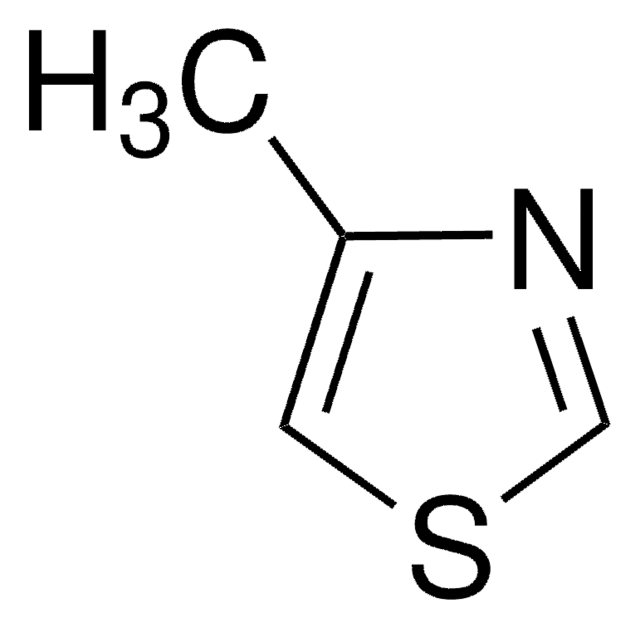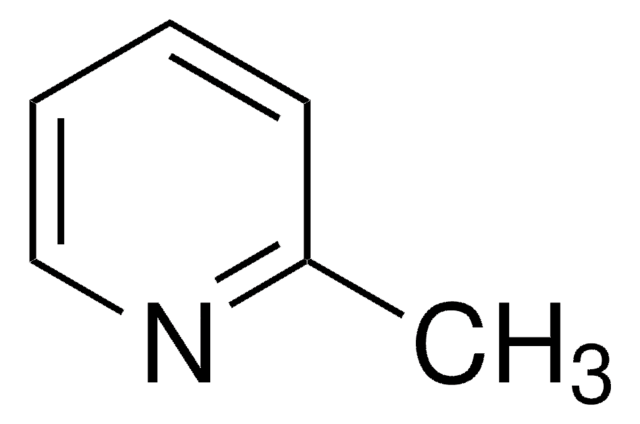W327107
2,3-Dimethylpyrazine
≥95%, FCC, FG
Synonym(s):
2,3-dimethyl-1,4-diazine
About This Item
Recommended Products
biological source
synthetic
Quality Level
grade
FG
Halal
Kosher
reg. compliance
EU Regulation 1334/2008 & 178/2002
FCC
Assay
≥95%
refractive index
n20/D 1.507 (lit.)
bp
156 °C (lit.)
density
1.011 g/mL at 25 °C (lit.)
application(s)
flavors and fragrances
Documentation
see Safety & Documentation for available documents
food allergen
no known allergens
Organoleptic
coffee; nutty; roasted
SMILES string
Cc1nccnc1C
InChI
1S/C6H8N2/c1-5-6(2)8-4-3-7-5/h3-4H,1-2H3
InChI key
OXQOBQJCDNLAPO-UHFFFAOYSA-N
Looking for similar products? Visit Product Comparison Guide
Application
- Characterization of key aroma compounds in Chinese smoked duck by SAFE-GC-O-MS and aroma-recombination experiments.: This study identifies and quantifies the key volatile compounds contributing to the aroma profile of Chinese smoked duck, utilizing sophisticated analytical techniques like SAFE-GC-O-MS, highlighting the impact of 2,3-Dimethylpyrazine among other compounds (Liu et al., 2023).
- Exploring the formation and retention of aroma compounds in ready-to-eat roasted pork from four thermal methods: A lipidomics and heat transfer analysis.: This research explores how different cooking methods affect the aroma profiles of roasted pork, including the formation of 2,3-Dimethylpyrazine, providing insights into optimizing flavor through lipidomics and heat transfer analyses (Liu et al., 2024).
- Flavor evolution of normal- and low-fat Chinese sausage during natural fermentation.: This article investigates the dynamic changes in flavor compounds, including 2,3-Dimethylpyrazine, during the fermentation of Chinese sausages, offering valuable information on flavor development in fermented foods (Xing et al., 2023).
- Aroma generation in sponge cakes: The influence of sucrose particle size and sucrose source.: This study examines how different types of sucrose affect the generation of key aroma compounds such as 2,3-Dimethylpyrazine in sponge cakes, shedding light on ingredient impacts on bakery product flavors (Garvey et al., 2023).
- Application of Maillard Reaction Products Derived Only from Enzymatically Hydrolyzed Sesame Meal to Enhance the Flavor and Oxidative Stability of Sesame Oil.: This research discusses the use of Maillard reaction products, including 2,3-Dimethylpyrazine, from sesame meal to enhance both the flavor profile and stability of sesame oil, illustrating the potential of enzymatic processes in flavor enhancement (Ma et al., 2022).
Signal Word
Danger
Hazard Statements
Precautionary Statements
Hazard Classifications
Acute Tox. 4 Oral - Eye Dam. 1 - Flam. Liq. 3 - Skin Irrit. 2 - STOT SE 3
Target Organs
Respiratory system
Storage Class Code
3 - Flammable liquids
WGK
WGK 3
Flash Point(F)
129.2 °F - closed cup
Flash Point(C)
54 °C - closed cup
Personal Protective Equipment
Certificates of Analysis (COA)
Search for Certificates of Analysis (COA) by entering the products Lot/Batch Number. Lot and Batch Numbers can be found on a product’s label following the words ‘Lot’ or ‘Batch’.
Already Own This Product?
Find documentation for the products that you have recently purchased in the Document Library.
Customers Also Viewed
Protocols
Separation of various pyrazines and sulfur compounds including carbon disulfide and dimethyl disulfide.
Our team of scientists has experience in all areas of research including Life Science, Material Science, Chemical Synthesis, Chromatography, Analytical and many others.
Contact Technical Service



















